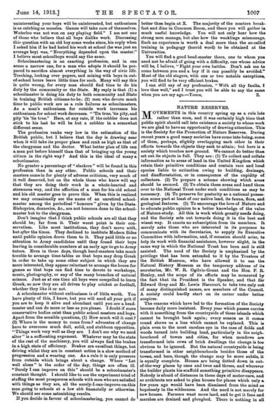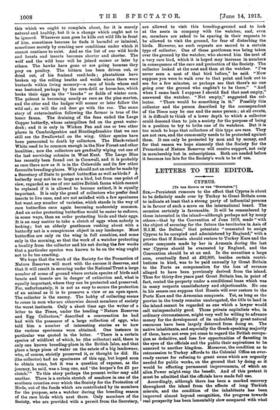NATURE RESERVES.
MOVEMENTS in this country spring up as a rule late rather than soon, and it was certainly high time that public spirit should call into existence a society to whose work we are glad to have an opportunity of drawing attention. This is the Society for the Promotion of Nature Reserves. During recent years a good many societies have come into being, some of them, perhaps, slightly overlapping each other in their efforts towards the objects they seek to attain; but here is a society which touches new ground. We cannot do better than set out its objects in full. They are : (1) To collect and collate information as to areas of land in the United Kingdom which retain their primitive conditions and contain rare and local species liable to extinction owing to building, drainage, and disafforestation, or in consequence of the cupidity of collectors. (2) To prepare a scheme showing which areas should be secured. (3) To obtain these areas and hand them over to the National Trust under such conditions as may be necessary. (4) To preserve for posterity as a national posses- sion some part at least of our native land, its fauna, flora, and geological features. (5) To encourage the love of Nature and to educate public opinion to a better knowledge of the value of Nature-study. All this is work which greatly needs doing, and the Society sets out towards doing it in the best and wisest way. It exacts no subscription from its members. It merely asks those who are interested in its purposes to communicate with its Secretaries, to supply its Executive Committee with information, and, if occasion should arise, to help its work with financial assistance, however slight, in the same way in which the National Trust has been and is still assisted. The need of the Society is emphasized by the privilege that has been extended to it by the Trustees of the British Museum, who have allowed it to use the Natural History Museum as the temporary address of its secretaries, Mr. W. R. Ogilvie-Grant and the Hon. F. R. Henley, and the scope of its efforts may be measured by the fact that its President is the Speaker, and that Sir Edward Grey and Mr. Lewis Harcourt, to take two only out of many distinguished names, are members of the Council. A society could hardly start on its career under better auspices.
The reasons which have led to the formation of the Society become daily more insistent. Every year which passes carries with it something from the countryside of these islands which cannot he brought hack again; every season as it comes round shows us a loss which cannot be replaced. This is plain even to the most careless eye in the case of fields and woods turned into building land, particularly in the neigh- bourhood of towns and cities, for when meadows are transformed into rows of brick dwellings the change is too obvious to be ignored. But the natural countryside is being transformed in other neighbourhoods besides those of the towns, and here, though the change may be more subtle, it is equally complete. Houses are being dotted down in out- of-the-way places by ones and twos and threes, and wherever the builder plants his scaffold something primitive disappears. Nobody is afraid of distances in these days of motor-cars, and so architects are asked to plan houses for places which only a few years ago would have been dismissed from the mind as hopelessly in the wilderness. And the need is not merely for new houses. Farmers want more land, and to get it fens and marshes are drained and ploughed. There is nothing in all
this which we ought to complain about, for it is merely natural and healthy, but it is a change which ought not to be ignored. Wherever man goes he kills out wild life in front of him, sometimes because he finds it harmful or inimical, sometimes merely by creating new conditions under which it cannot continue to exist. And so the list of our wild birds and beasts and insects becomes shorter and shorter. The wolf and the wild boar will be joined sooner or later by others. The hawks have gone or are going because they prey on poultry. The bittern has been driven out, or dried out, of his fenland reed-beds ; plantations have broken up the rolling heaths and wolds where there were bustards within living memory—a race of birds whose end was hastened perhaps by the corn-drill or horse-hoe, which broke their eggs in the " brecks " or fields of winter corn. The polecat is becoming nearly as rare as the pine marten, and the otter and the badger will sooner or later follow the wild cat ; so will the red deer go with the roe. The same story of extermination following the farmer is true of the lesser fauna. The draining of the fens ended the Large Copper butterfly, whose caterpillars fed on the great water- dock ; and it is only in Wicken Fen and one or two other places in Cambridgeshire and Huntingdonshire that we can still see the Swallowtail on the wing. Other species have been persecuted to death by collectors. The Black-veined White used to be common enough in the New Forest and other localities ; now the collectors are gradually wiping out one of the last surviving colonies in West Kent. The Large Blue has recently been found out in Cornwall, and it is probably as rare there now as it is in the Cotswolds and its few other favourite breeding-places. Why should not an order be made by a Secretary of State to protect butterflies as well as birds ? A butterfly may not be so large as a bird, but from one point of view, regarded as one of our native British fauna which cannot be replaced if it is allowed to become extinct, it is equally important. It is only the greed of collectors who prefer dead insects to live ones, and are not satisfied with a few specimens but want any number of varieties, which stands in the way of rare butterflies once again becoming moderately common. And an order protecting butterflies would be easier to enforce, in some ways, than an order protecting birds and their eggs. It is an easy matter to take a clutch of eggs when nobody is looking ; but an elderly gentleman rushing about with a butterfly net is a conspicuous object in any landscape. Most butterflies are only on the wing in full sunshine, and some only in the morning, so that the work of a watcher protecting a locality from the collector and his net during the few weeks that a particular species was known to be on the wing ought not to be too exacting.
We hope that the work of the Society for the Promotion of Nature Reserves will meet with the success it deserves, and that it will result in securing under the National Trust a large number of areas of ground where certain species of birds and beasts and insects are in danger of extinction and, what is equally important, where they can be protected and preserved. For, unfortunately, it is not as easy to secure the protection of an animal as it is to preserve a view or an open space. The collector is the enemy. The hobby of collecting seems to rouse in men wherare otherwise decent members of society the worst instincts. Only a short time ago the writer of a letter to the Times, under the heading " Nature Reserves and Egg Collectors," described a conversation he had had with the possessor of a large collection of eggs, who told him a number of interesting stories as to how the various specimens were obtained. One instance in particular was quoted in the letter. " There is a certain species of wildfowl of which, he (the collector) said, there is only one known breeding-place in the British Isles, and that place a large piece of water on the estate of a big landowner, who, of course, strictly preserved it, or thought he did. He (the collector) had no specimens of this egg, but hoped soon to obtain some, but it was a question of expense, as the journey, he said, was a long one, and ' the keeper's fee £5 per clutch.'" To this story perhaps the present writer may add another. There is a certain stretch of seashore in one of the southern counties over which the Society for the Protection of Birds, out of the funds which are contributed by its members for the purpose, sets a watcher during the breeding season of the rare birds which nest there. Only members of the Society, who are provided with a permit from the Secretary, are allowed to visit this breeding-ground and to look at the nests in company with the watcher, and, even so, members are asked to be sparing in their requests to be allowed to visit the ground, for fear of disturbing the birds. However, no such requests are sacred to a certain type of collector. One of these gentlemen was being taken over the ground by the watcher, who showed him the nest of a very rare bird, which it is hoped may increase in numbers in consequence of the care and protection of the Society. The collector looked at the nest and then at the watcher. "I've never seen a nest of that bird before," he said. "Now suppose you were to walk over to that point and look out to sea for a few minutes, or perhaps see that there's no one going over the ground who oughtn't to be there." "And when I came back I suppose I should find that nest empty," answered the .watcher. " Not empty," suggested the col- lector. "There would be something in it." Possibly this collector and the person described by the correspondent of the Times may be one and the same person ; at all events, it is difficult to think of a lower depth to which a collector could descend than to join a society for the purpose of being in a position to try to bribe one of its watchers. But it is too much to hope that collectors of this type are rare. They are not rare, and the community needs to be protected against them. It can only be protected by men and by money, and for that reason we hope sincerely that the Society for the Promotion of Nature Reserves will receive support, not only in membership but in subscriptions. Both are needed before it becomes too late for the Society's work to be of use.















































 Previous page
Previous page